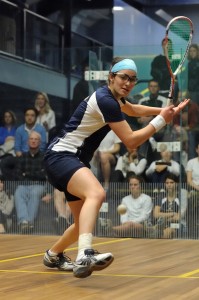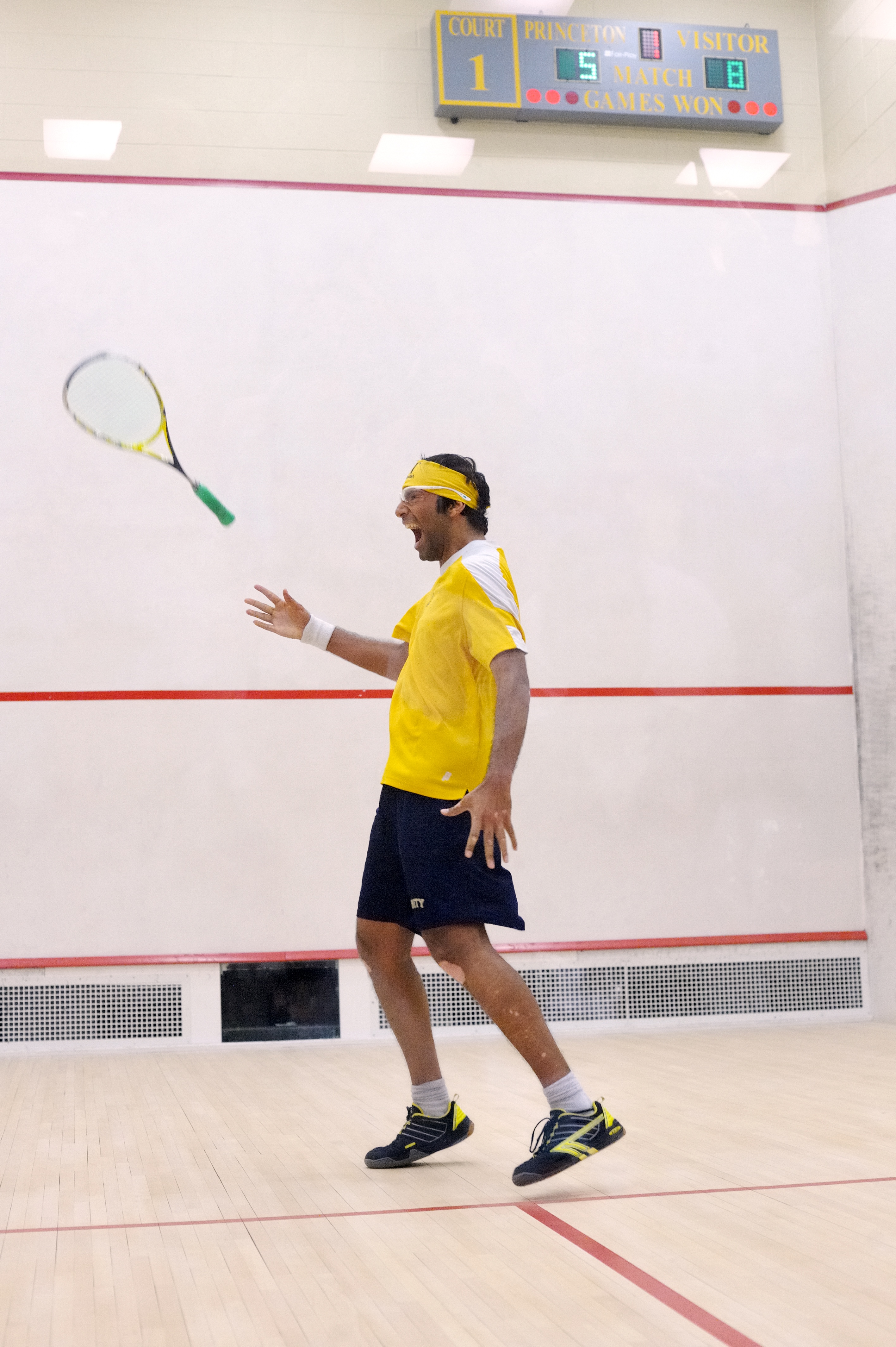By Anne Bello and Michael T. Bello
co-Editors of CollegeSquashAssociation.com
With new players, a new scoring method, new teams, and a new website, the 2009-2010 college squash season will build on the excitement of last year’s dramatic national championships.
In the 2009 Potter Cup finals, Trinity battled Princeton for the men’s team title. With the two teams tied at 4-4, the deciding match came down to the number ones: Trinity’s Baset Chaudhry and Princeton’s Mauricio Sanchez. Chaudhry came from behind in the fifth game to win, extending the Bantams’ winning streak to eleven consecutive national titles. Other winners included Western Ontario (Hoehn Cup), Middlebury (Summers Cup), Connecticut College (Conroy Cup), Drexel (Chaffee Cup), Kenyon (Serues Cup), Lafayette (Hawthorn Cup), and Illinois (Emerging Teams Division).
On the women’s side, Harvard and Princeton faced off for the Howe Cup and the national title. In the final flight of matches, the Tigers’ Amanda Siebert and the Crimson’s Nirasha Guruge played to five games in the number one match, with Siebert sealing a third consecutive national title for Princeton with a 9-1 win in the fifth. The other division titles went to Brown (Kurtz Cup), Amherst (Walker Cup), William Smith (Epps Cup), and Vermont (Emerging Teams Division).

In the women’s individual championships, Pennsylvania junior Kristen Lange and Trinity first-year Nour Baghat met in the Ramsay Cup finals. As runner-up the past two seasons, Lange entered the match with considerable experience, but Baghat proved too much, winning in four games. For the men, Chaudhry and Sanchez met once again in another five-game thriller, with Chaudhry taking home the Pool Trophy for the second year in a row. In the B draws, Williams’ Jennifer Coxe defeated Yale’s Lexi Van Arkle for the Holleran Cup, while Trinity’s Chris Binnie edged Western Ontario’s Chris Hanebury for the Molloy Cup.
Last year’s championships reflect the growth of college squash. With five flights at the women’s team championships and eight at the men’s, the national tournaments have become larger and longer. This season, the CSA will adopt Point-A-Rally scoring to 11 (PAR 11), which may ease the tournaments’ tight time frames.
At the Howe Cup last February, the scoring change came to a vote. According to Shona Kerr, the women’s CSA president, “We had a quality debate on the PAR 11 issue, but when it came to the vote it was pretty clear cut to follow the rest of the squash world globally on this one.”
The following weekend, the issue was again presented at the men’s National Team Championships. The men followed the women and elected to change to PAR 11 as well. “There was a strong voice of support for the move. All of the coaches are excited to try it out this year!” reports men’s CSA president Bob Callahan.
PAR scoring is not a new concept for college squash. Both men’s and women’s intercollegiate squash used PAR 15 for decades. In 1994, one year after moving from hardball to softball, women’s college squash changed from PAR 15 to hand-in-hand-out scoring. The men continued with PAR 15 for a few more seasons, but in 2001 they also changed to hand-in-hand-out scoring.
The change to PAR 11 will add to the intrigue for what should be a very competitive season for women’s college squash. Princeton is looking to earn another team championship; however, Harvard and Trinity, who did not graduate any varsity players last season, are looking to dethrone the Tigers. In addition, Pennsylvania and Yale are eager to contend for the team title.
There will be an influx of talented junior players into women’s college squash. Three members of the U.S. team that earned fourth place at this summer’s World Junior Championships in Chennai, India, will be entering college. Julie Cerullo (Princeton), Natasha Kingshott (Harvard), and Yarden Odinak (Pennsylvania) will all compete for top college teams. In addition, Laura Gemmell (Harvard), who represented Canada, and Rachael Goh (Pennsylvania), who represented Malaysia, will be joining the college ranks.
The Ivy League appears strong with seven teams in the preseason top 10. Although each of the teams could earn the league championship, the February 7th match between Princeton and Harvard may ultimately decide it.
In the New England Small College Athletic Conference (NESCAC), Trinity will look to continue its dominance. The Bantams have won the conference every year since its inception in the 2006-2007 season. The majority of NESCAC schools will compete for positions in the top 20 this season.
Mount Holyoke is seeking to earn its fourth consecutive Seven Sisters title, which would tie Vassar’s record. Smith, Vassar, and Wellesley will be looking to prevent another title run by the Lyons. Vassar is also looking to defend its Liberty League tournament championship.
For the men, all eyes will be on Trinity. After all, at 202 consecutive victories, the Bantams’ winning streak is the longest in varsity intercollegiate sports history. The Bantams will also be seeking their fourth consecutive NESCAC tournament title.
Princeton and Rochester are eager to end Trinity’s winning streak and earn their own national team championship. Rochester, who faces Trinity on January 22, upset Yale at last season’s Potter Cup to finish the season ranked third in the nation. The Yellowjackets will also be seeking their third consecutive Liberty League tournament title.
Princeton had two opportunities to defeat Trinity last season; however, the Bantams emerged victorious in both the regular season finale and the Potter Cup finals by a score of 5-4. This season, Princeton will visit Trinity on February 13. Yale, Cornell, and Harvard will be battling the Tigers for this year’s Ivy League title.
Similar to the women, three players from the boys’ Junior National squad will be competing for college teams. Princeton’s Todd Harrity will face his Junior National teammates Alex Ma and Zeke Scherl when the Tigers visit Harvard on February 7.
The national team championships will give former junior players another chance to reunite. This season, Yale University will host the men’s team championships (February 19-21) and the women’s team championships (February 26-28). Trinity College is hosting the national intercollegiate individual tournament (March 5–7).
A number of emerging teams will be making their first trips to team championships this year. Intercollegiate squash grew by fifty percent over the last decade and if the interest from new teams is any indication, that growth should continue. “The game of college squash is the most dynamic and rapidly growing entity in the world of squash,” explains Trinity men’s coach Paul Assaiante. “Not only in terms of the standard of play, the depth of the teams’ rosters, but also in terms of the growth of emerging teams.”
To facilitate the continued growth of intercollegiate squash, the CSA has launched a new website, CollegeSquashAssociation.com. Team previews, schedules, match recaps, featured stories, historical information, photographs, videos, and rankings will be published throughout the year. The site is the source for fans of college squash to follow the action.
Looking to Repeat

Three short years ago, playing college squash in the United States was something Egypt’s Nour Bahgat hadn’t considered. And why would she? She was in her last year of high school in Cairo, and she was training for the 2007 World Junior Women’s Team Championships in Hong Kong—an event her Egyptian team ultimately won, just a week after she reached the quarterfinals in the individual event.
But after meeting Princeton’s Head Coach, Gail Ramsay, at the British Junior Open in 2006, Bahgat pursued the idea and followed up on Ramsay’s recommendation that she apply for a Muslim Scholarship for Post-Graduate study at Lawrenceville Academy. Bahgat did, she went, and so the foundation had been laid for a college squash career. Ironically, however, it wouldn’t be at Princeton.
While Bahgat had good grades, “Princeton didn’t know how to rate them compared to American grades,” said Bahgat. After taking the TOEFL (Test of English as a Foreign Language), Ramsay spoke with Wendy Bartlett at Trinity about Bahgat, and the rest is becoming history.
Though relatively unkown in local circles, Bahgat entered her freshman year at Trinity with hopes of wining every match. Heady stuff, but she reached that goal, including the individual championship when she beat Penn’s Kristen Lange in four contentious games while playing on an injured ankle.
And that win, coupled with Basset Chaudhry’s men’s singles title, marked the first time the two champions hailed from the same school since 2007.


